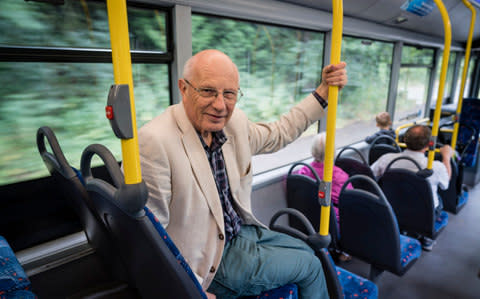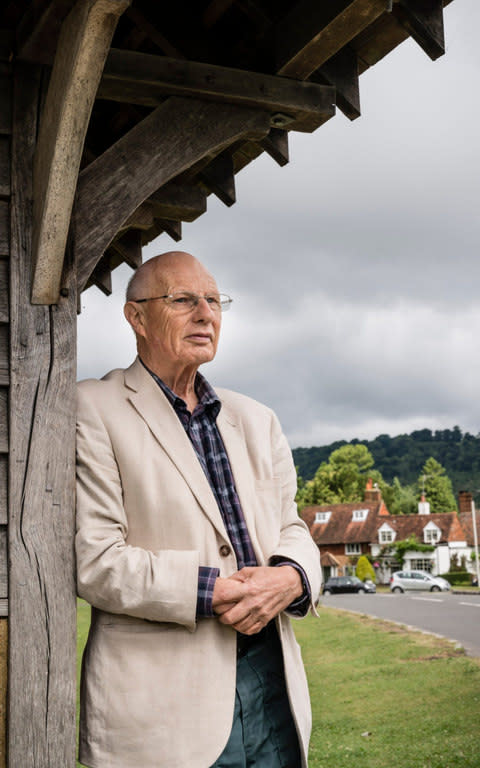Meet the man who has travelled Britain solely by using No 94 buses

Traversing the country solely aboard No 94 buses sounds like divine punishment. May ye be cursed to wander these isles on buses named for the 94 times ye tutted at the driver. A pox on he who did on 94 occasions rest his feet upon the seats or on she who 94 times did drive illegally in the bus lane.
David was nine when, in 1944, his father – an acoustical engineer who had designed quiet aircraft cabins for Winston Churchill to work in – was killed by a bomb
As with anything, though, one man's pain is another man's pleasure. Meet David McKie, a chuckling, garrulous man of 82 – certainly not 94 – who's sitting opposite me in a central London café. It must be strange for him that the view from the window isn't changing; he's spent the best part of three years catching No 94s all over the country, and only let up in order to write a book about it.

The idea, he says, was to "travel the land using only buses which had identical numbers. So the sequence of places through which I journeyed would be entirely arbitrary."
And so the book, Riding Route 94, sees him travel from Blewbury to Didcot, from Selby to Tadcaster, from Edinburgh to London, and so on.
"The whole point was to go to places I'd never thought of before," David explains. He encountered colourful idiosyncrasies galore, while also glimpsing the tension and ructions that were to erupt in the Brexit referendum and its aftermath.
Really I should have given up the excursions, but my wife knows as well as I do that when I give up it will be absolutely fatal
Let's talk about the fun idiosyncrasies first. McKie, a former political reporter at The Guardian, is nothing if not a Stakhanovite researcher. Reading his book, not a local historical chronicle appears unread. It's dense at times but also entertaining, as illustrated by his visit to Charlton-on-Otmoor, a countryside village on his Bicester-Oxford ride. In the 19th century, McKie tells us, it was believed that the village's inhabitants had "webbed feet", and their "own way of walking, best described as a slouch, apparently to cope with the wet conditions."

Since the Victorian era, our lives and livelihoods have become far less firmly anchored to particular places. (Do you live where you grew up? If your answer is "no", then you are part of this trend.) This is effectively a process of homogenisation, with local eccentricities slowly eroded as once-remote towns and villages become better connected with each other. McKie conducted his research in the months before last June's vote to leave the EU, and he says that his time in these rapidly-changing places gave him the feeling that Brexit was more likely than the polls had indicated.
It was believed that the village's inhabitants had 'webbed feet', and their 'own way of walking, best described as a slouch, apparently to cope with the wet conditions'
"I went to places like Boston in Lincolnshire," recounts McKie, "places that feel they've lost their identity." Later, as we finish our coffees, he says: "When I wrote about politics I wrote that the supreme skill of politics was to learn to balance continuity with change, and if you rush the change too much people will turn against you."
And so Britain voted to leave, and places like Charlton-on-Otmoor no longer seem quite so alien to their visitors as they would have done 150 years ago. Nevertheless, says McKie, "there is still a feeling there of things being different and of being cut off from society. You walk through Charlton-on-Otmoor and I can't think of anywhere that has that sort of path-lost atmosphere. It was always rebellious" - he writes of the village's violent obstruction of the gentry's attempts to claim common land - "and someone pointed out to me the name, and it's glorious."

The name is Charlton: "churl-town". "Churl" probably here meant "peasant", also came to describe someone who is mean-spirited or ungracious, i.e. someone who is churlish.
It is exactly the kind of place that McKie must be thinking of when he says that, "if I have a hobby, from an early age it's been mooching about in strange places."
His has an independent streak that may well go back to his father's wartime death. David was nine when, in 1944, his father – an acoustical engineer who had designed quiet aircraft cabins for Winston Churchill to work in – was killed by a bomb that dropped on Aldwych, London. David and his mother then moved to Leeds.
If I have a hobby, from an early age it's been mooching about in strange places
"You just had to adjust to the fact my father had died. My mother just had to cope with everything and was a very independent person, and I think that rubbed off on me."
In his own words, McKie could be enjoying "a quiet retirement in a corner smoking my pipe and reading old novels". His jaunts take him away from his wife, Beryl, to whom he dedicated the book. "One reason I particularly miss my wife on these trips" – she is not well enough to join him – "is that she's a botanist. I wonder what plants are called – trees and birds that I've never been able to identify but I'd love to."
Yet still his itchy feet lead him from that pipe smoke-scented corner. "Really I should have given up [the excursions], but she knows as well as I do that when I give up it will be absolutely fatal."
So for the time being McKie is still at liberty to add to his already enormous knowledge of Britain's towns and villages. "If you say 'Clitheroe'," he says enthusiastically, "most people do not know where it is, but it's a really excellent little town on the edge of the forest of Bowland. But most people have never been!" He loves the Isle of Mull, loves the little Kentish villages where you can watch the village cricket team and then join them in the pub afterwards.

One more thing. Why the number 94? He says it gave him just the right number of buses to choose from (imagine taking all the No 1s in the country), and admits he likes its use as a generic large number in Private Eye. My guess? This well-travelled octogenarian intends to spend a good few more years on the road.
Riding Route 94: An Accidental Journey Through the Story of Britain (Pimpernel Press) is out now in paperback (£9.99)

